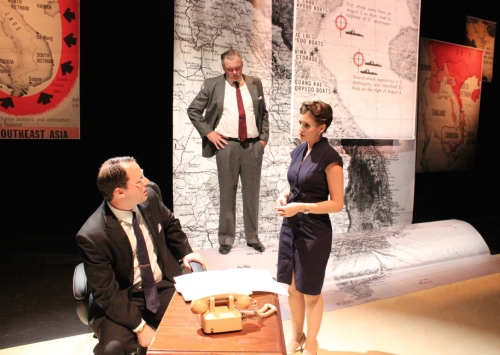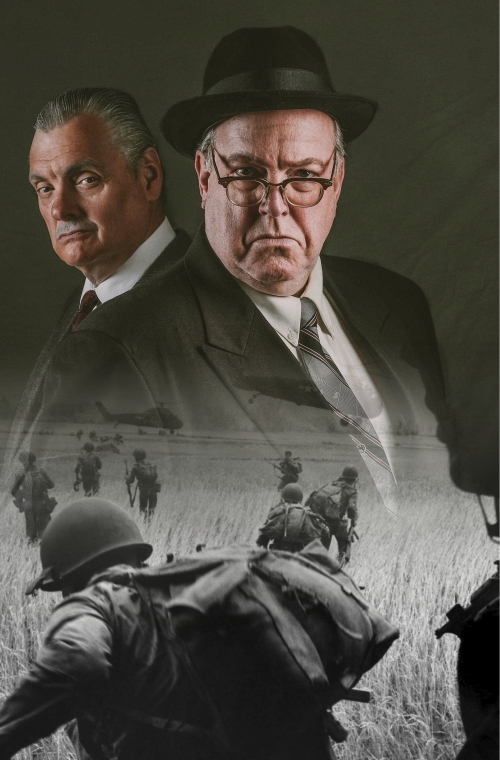
Naval intelligence officer, Lieutenant Doris Little, (Heather Dudenbostel) confronts Secretary of Defense Robert McNamara (Robbie Hankins) about the attack in the Gulf of Tonkin as Senator Wayne Morse (Greg Monahan) looks on, in The Ghosts of Tonkin. Photo credit: Angela Kiser
A unique production is coming shortly to ACT Theatre from Bellingham Theatre Works. The Ghosts of Tonkin commemorates the 50-year anniversary of the Gulf of Tonkin resolution, a secret agreement by public officials that brought about the Vietnam War.
Even today, we are still learning about events that happened long ago in our country that we might think have already been completely exposed to history, yet, often documents are still kept secret and there is much more to learn.
As the press release for the production tells it, “In August 1964, our smoldering involvement in Vietnam was ignited into all-out war when intelligence agencies reported that North Vietnam had attacked a US destroyer in the Gulf of Tonkin. Although that was later revealed to be “bad intelligence,” it gave the Johnson Administration the excuse it needed to introduce a resolution giving LBJ authority to use military intervention in Vietnam. Only one thing stood in the way of President Johnson’s plans in Vietnam: Oregon Senator Wayne Morse.
“Senator Wayne Morse was an outspoken critic of US intervention in Vietnam. He served on the Senate Foreign Relations committee which, on August 6, 1964, held a hearing on Johnson’s Gulf of Tonkin resolution. Facing Secretary of Defense Robert McNamara, Johnson’s front man for ramming the resolution through congress, Senator Morse passionately argued against the resolution.
“The administration kept the public and congress in the dark about the serious doubts surrounding the North Vietnamese attack in the Gulf. The resolution received overwhelming approval on the floor of the House and Senate, with only Senator Morse of Oregon and Senator Gruening of Alaska voting against it.”
Steve Lyons, playwright, based his play on transcripts of telephone conversations, U.S. Senate transcripts, recently declassified NSA documents, and other sources. SGS spoke to him about why and how he decided to write this play.
SGS: What made you want to write about this topic?
Steve Lyons: I would have never written it if we had not invaded Iraq. When the Iraq War began, people drew an analogy between the genesis of that war, and the beginnings of the Vietnam War. News media in the US asserted that the “weapons of mass destruction” of the Iraq War were the moral equivalent of the “Gulf of Tonkin incident” of the Vietnam War. I had no idea what they were talking about. But it made me curious to learn more about the origins of the Vietnam War. That curiosity eventually led to this script.
My source material takes up seven feet of my shelf. Plus I listened to dozens of hours of telephone conversations on tape. And I interviewed countless people who were somehow involved in that fateful first week of August 1964.
The telephone conversations were key to making this play authentic. In the play, many of the interactions that take place in person actually took place on the phone. The declassified Senate hearing transcript is also crucial. The declassified NSA documents, including cables and other intelligence, helped focus this story.
SGS: What surprised you the most during the process?
SL: How difficult it is to create a story from a massively complicated real event.

Senator Wayne Morse (Greg Monahan) and President Lyndon Johnson (Gray Eubank) in The Ghosts of Tonkin. Photo credit: Levy Moroshan
SGS: How did you decide how to arrange the material?
SL: I went to a talk by Robert Schenkkan, the playwright of All the Way and Great Society. In the course of the talk he said he made up about half of those plays. I thought “Gee, I can just make stuff up? That sure would have been easier!” I made up some encounters and some dialogue but mostly I stuck to verbatim dialogue, which is easy to do because of the hours and hours of phone recordings. But deciding what dialog to include is frustrating and difficult, because there is just so much of it. Where do you start?
A movie or play can’t have one-dimensional characters. You have to find the Achilles heel of the good guy. You have to find virtue in the bad guy. Finding virtue in my bad guy, Secretary of Defense Robert McNamara, proved a real challenge. I spent months struggling with his character. He misled us into a war that ultimately killed two million people. Part of the goal as a writer in wading through all this source material was searching for that kernel of goodness in Robert McNamara. And it has to be a kernel so compelling that we think, “Gee, in his shoes I may have done the same.” I did discover that kernel of goodness.
I have been obsessed with the origins of the Vietnam War ever since reading about it. Because we haven’t learned from it. I have been determined for twelve years to get this in front of an audience.
SGS: What would you like to do with the piece in the near future?
SL: I feel strongly that this story needs to be told. I have offered it to vets organizations for free to be used as a fundraiser or what have you. Or if a theatre wanted to produce it, they can have it royalty free. I just want to get this out in the world.
I think this play is such a fabulous springboard for discussion. We hold a discussion after every performance because people need to talk about it. This is not an easy story to witness, particularly for Vietnam vets. The play lays out the casual, almost flippant, attitude that pervaded congress as they voted to use military intervention in Vietnam. There are people in the audience who lost comrades and loved ones in the Vietnam War. The play brings up the question “for what?” In discussions, vets have spoken about their experiences and their emotions in watching this play. The post-play discussion is cathartic for many audience members.
In Seattle, each discussion will be moderated by local media personalities, including Dave Ross (KIRO), Manda Factor (KOMO radio), Florangela Davila (KPLU), Elisa Jaffe (KOMO 4), Ross Reynolds (KUOW), and Allen Schauffler (Al Jazeera).
For information or tickets for this production, go to www.acttheatre.org.



















